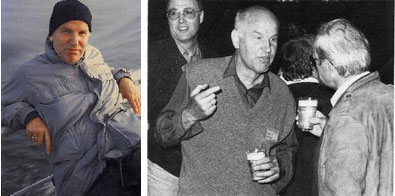Egon Degen
Curriculum Vitae

Lake Baikal, April 1988 Wilsede, June 1988
Professor E. T. Degens, geologist and geochemist, died at the age of 60 on 19 February 1989. He was born on 16 April 1928; he studied geology in Tübingen and in Bonn and became a university lecturer at the Würzburg Faculty of Geology in 1959. After a short period at Pennsylvania State University he returned to Würzburg where he laid the foundations for the establishment of one of the world's first organic geochemistry laboratories. This laboratory was the training ground for many of the most prominent geochemists in the world today.
He later joined the California Institute of Technology and began his work on stable isotopes, to be followed by that on the composition of natural organic matter in water and sediments. His first textbook. Geochemistry of Sediments (Prentice Hall 1965), which has also been translated into German. Russian and Chinese, dates from this period. It was the first textbook ever to treat organic matter as an important component of sediments. After this sojourn in California, he traveled with his wife and sons to Massachusetts where he found a second home in the Woods Hole Oceanographic Institution. He was responsible for conducting two of the most well-known multidisciplinary marine expeditions: the expedition of the research vessel Atlantis II in the Red Sea (1965) when the first hydrothermal ore deposits on the sea floor were discovered and the 1966 Black Sea expedition where, for the first time, an anoxic deep-water body was studied in detail. Results of both expeditions were published in book form by Degens (Degens, E. T. and D. A. Ross (Eds.), 1969: Hot Brines and Recent Heavy Metal Deposits in the Red Sea. New York, Springer, 600pp.: Degens, E. T. and D. A. Ross (Eds.). 1974: The Black Sea-Geology, Chemistry and Biology. Amer. Assoc. Petrol. Geol. Mem. 20, 633pp.). Further expeditions led him to the East African Rift Lakes where his team discovered the hydrothermal activity of Lake Kivu.
His main interest remained, however, natural organic matter and its composition and transport in the oceans and sediments. Degens`s work on stable isotope composition and the distribution of organic matter in shells provided fundamental knowledge about the origin of life, evolution and biomineraliza-tion. Egon T. Degens was appointed full professor at the Institute of Geology and Paleontology of Hamburg University in 1973. Shortly thereafter he established a large biogeochemistry laboratory and launched in 1977 the SCOPE/UNEP (Scientific Committee on Problems of the Environment/United Nations Environment Programme) International Carbon Unit, which dealt with the cycles of biogeochemical elements, especially carbon, and their interaction with man. He also devoted great attention to the car-bon dioxide issue and subsequent climatic changes.
In 1980 he initiated a worldwide research pro-gramme on carbon and mineral transport in major world rivers the results of which are summarized in this book. The publications by the Unit of the results of these scientific endeavors already total six volumes. In the framework of his SCOPE activities, he stimulated and encouraged colleagues from a wide range of disciplines to look deeper into the global issues of environmental change. He has organ-ized a total of ten scientific workshops for SCOPE in all the continents. He established special ties with colleagues and co-researchers in Turkey with whom he directed research on the largest soda lake in the world. Lake Van, as well as on the Black Sea and the Sea of Marmara. In 1981 he spent six months as visiting professor at the University of Tianjin, China and was appointed honorary professor by the Academia Sinica. He also kept closely in Contact with colleagues in the Soviet Union and East-ern bloc countries. His last trip, in September 1988, took him to Lake Baikal, during which a Russian-German expedition was planned for summer 1989.
During his last years in Hamburg he conducted, with his collaborators, extensive research on the state of the North Sea, on sedimentation mechanisms in the open ocean, on theoretical questions concerning biomineralization and on the hydrology and biogeochemistry of regional and intercontinental seas (Black Sea, Arabian Sea, Red Sea, Bay of Bengal, Flores Basin, China Sea, and the Mediterranean). Plans developed from these activities for the establishment at Hamburg University of an Institute of Biogeochemistry and Marine Chemistry, which has now been realized. This Institute will form an integral part of the new Hamburg Research Center for Marine and Atmospheric Sciences.
Degens`s extraordinarily widely oriented interests led to the publication of more than 300 articles and 19 books. The last book, which he was able to complete shortly before he died, pointed out the role of biogeochemistry for the evolution of the world and should prove to be one of the most promising text-books on geology (Degens, E. T., 1989: Perspectives on Biogeochemistry. Springer Verlag, Berlin, Heidelberg, New York, London, Paris, Tokyo, 423pp.). His colleagues and friends from all over the world contributed to a Festschrift on the occasion of his 60th birthday (Ittekkot, V., S. Kempe. W. Mi-chaelis and A. Spitzy (Eds.). 1990: Facets of Modern Biogeochemistry. Dedicated to E. T. Degens on the occasion of his 60th birthday. Springer, Heidelberg, New York, 433pp.). This birthday (which proved to be his last) found E. T. Degens on board the American research vessel Knorr, with col-leagues from Woods Hole and Izmir, as it entered the Black Sea on April 16, 1988, for a large expedi-tion which aimed to resolve some of the issues Degens had specified during his 1966 explorations.
Aus: Degens, E.T., S. Kempe J. Richey (Eds.) (1991): Biogeochemistry of Major World Rivers. - SCOPE Report 42, Chichester, New York, Brisbane, Toronto, Singapore, J. Wiley Sons: 356 pp.

